Kamila Valieva timeline: From failed drug test to stripped Olympic gold medal
The U.S. will now take gold in the team event after Russia was disqualified.
Nearly two years after the 2022 Olympics, the Court of Arbitration for Sport finally issued a ruling Monday on Russian figure skater Kamila Valieva's failed drug test prior to the 2022 Winter Olympics, disqualifying her from competition and stripping Russia of its team event gold medal from Beijing.
The court ruled Valieva ineligible for a period of four years, starting on Dec. 25, 2021, when she failed the drug test, and ruled all competitive results over that period -- including the 2022 Olympics -- would be disqualified, "including forfeiture of any titles, awards, medals, profits, prizes, and appearance money."
The United States team, which had finished second in the team event behind Russia, will now be the gold medalists, the International Skating Union confirmed.
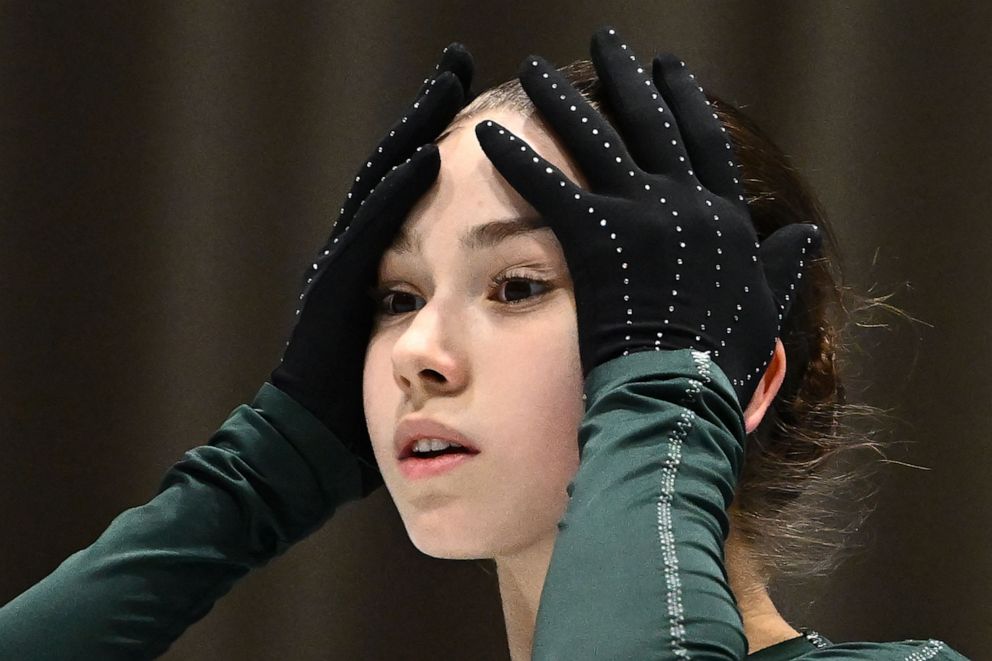
The story of Valieva, a former junior world champion, began in late 2021 when she burst onto the senior stage and emerged as the top contender for Beijing gold.
In no time, the then-15-year-old quad queen was racking up record totals on the ice.
But her dramatic ascent hit a massive bump when it emerged, first in Russian media reports, that Valieva had failed a test for performance-enhancing drugs.
Here's how the drama has unfolded (all dates local time):
Dec. 24-25, 2021
The Russian Figure Skating Championships, which help to determine who would be selected to compete in Beijing, were held in Saint Petersburg, Russia, between Dec. 21 and 26 with the women's individual event being held on Dec. 24 and 25. Valieva would go on to dominate the competition despite Russia fielding several Olympic medal contenders.
On Dec. 24, Valieva skated in the short program, scoring a 90.38. The score put her in first place by a wide margin ahead of Anna Shcherbakova (81.46).
Valieva competed in the free skate on Dec. 25, posting 193.10, again the highest score, nearly 20 points ahead of the second-highest competitor, Alexandra Trusova (174.44).
Valieva's final score (283.48) was 35 points ahead of second place. All three of Valieva's scores were women's records, though the International Skating Union does not recognize records in national competitions.
The same day as her victory, the Russian Anti-Doping Agency, or RUSADA, collected a sample from Valieva to be tested for performance-enhancing drugs.
Jan. 13-14, 2022
The European Figure Skating Championships were held in Tallinn, Estonia, from Jan. 12 to 16, with the women's individual competition taking place on Jan. 13 and 15.
Again, as she had throughout the fall and winter, Valieva was far and away the best performer.
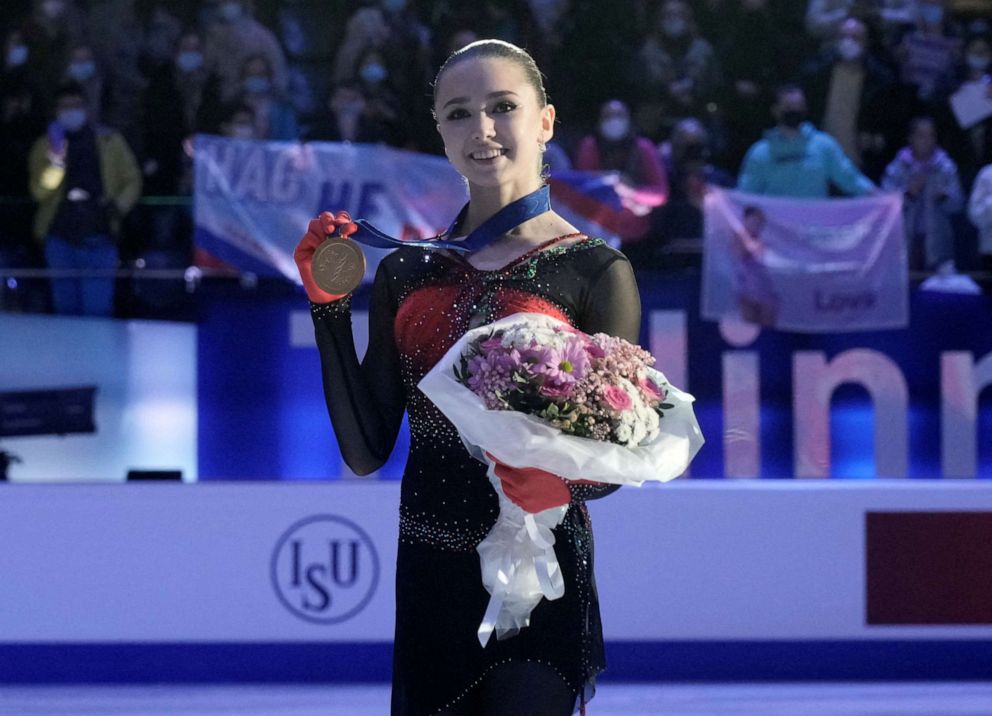
She scored 90.45 in the short program, officially the highest score ever recorded in a short program. It was more than 14 points higher than the second place skater, Belgium's Loena Hendrickx.
Two days later, she put the finishing touches on her gold medal performance with a 168.61 in the free skate, despite falling on a triple axel.
Feb. 6, 2022
Valieva competed in the women's single skating short program during the team event in her first appearance in the Beijing Winter Olympics.
As expected, she topped the standings with a 90.18 to dwarf Japanese skater Wakaba Higuchi's second-place score of 74.73. The score was just shy of her own world record, but she became one of only four women to land a triple axel at the Olympics.
The performance scored the Russian Olympic Committee 10 points and pushed them past the United States and into first place.
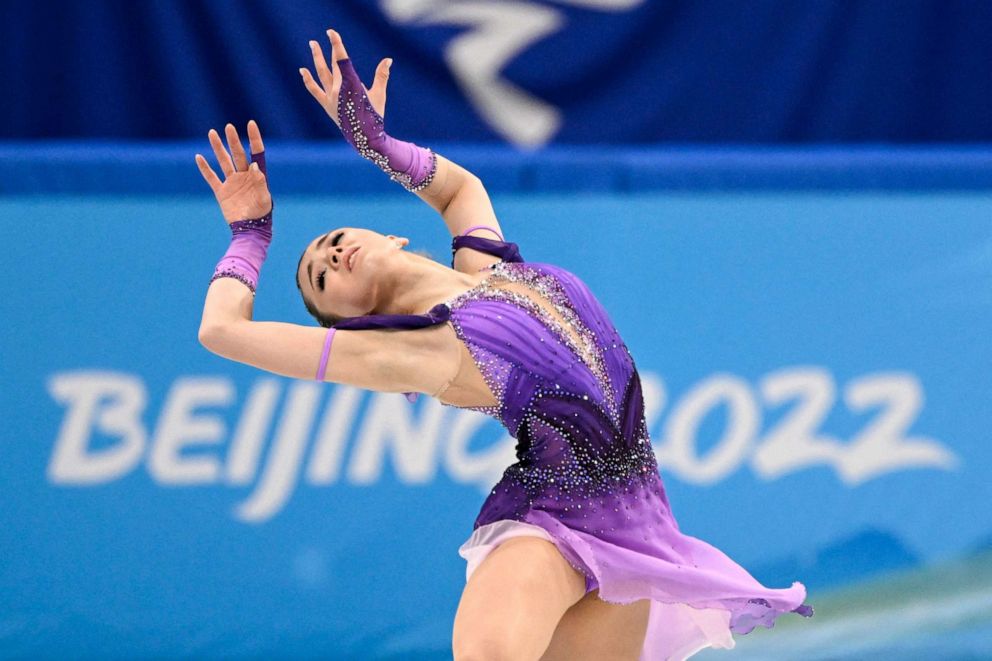
Feb. 7, 2022
Valieva helped the ROC lock up the gold medal in the team event with her performance in the free skate.
She posted a 178.92, despite a fall just like at the European championships. Still, Valieva twice landed the hardest jump in figure skating, a quadruple jump. She became the first woman to land a quadruple salchow and the first to land a quadruple toe loop in Olympic competition. She fell on her third attempt at a quad.
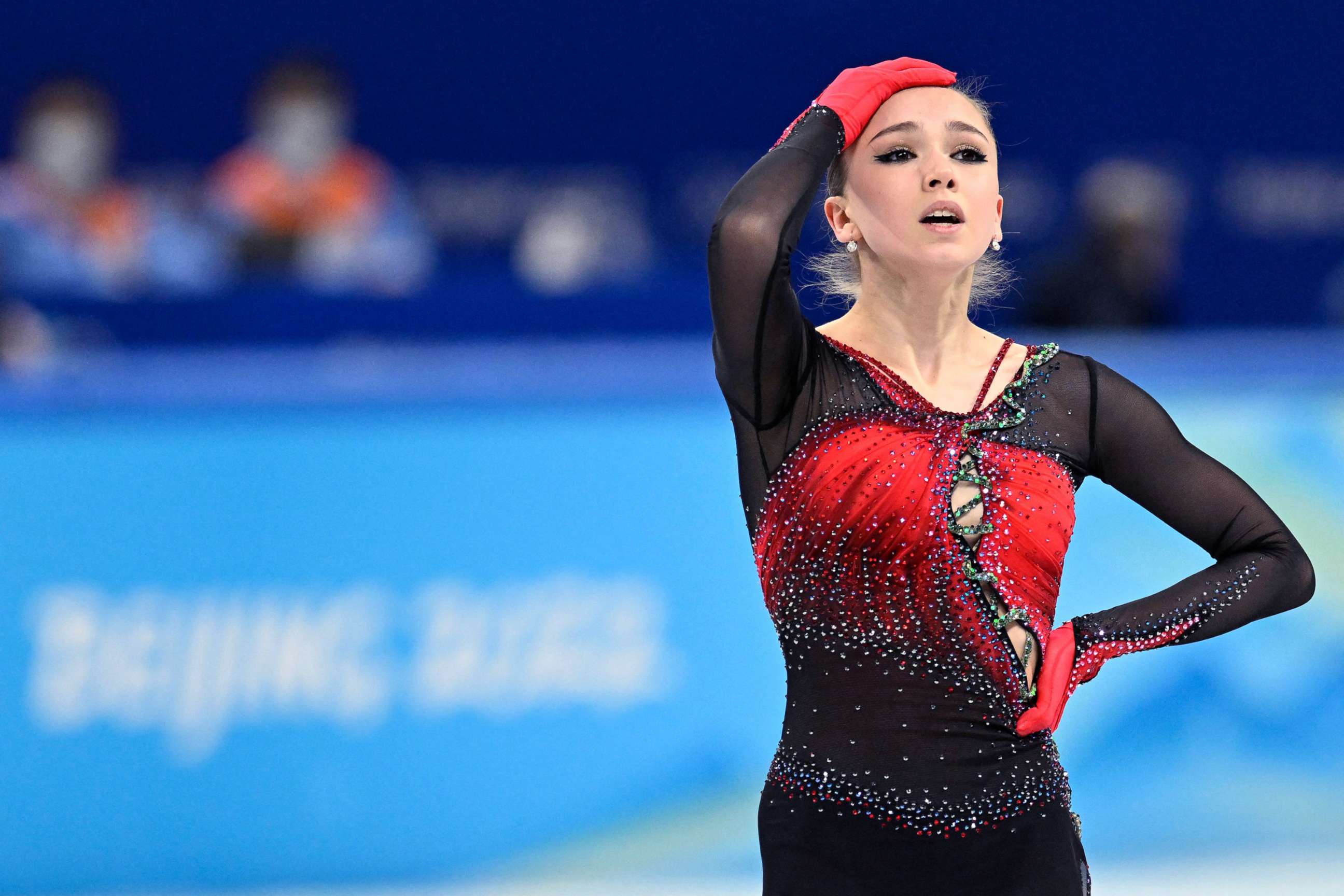
Feb. 8, 2022
Viewers got the first inkling of an issue with the ROC team when the medal ceremony for the team event scheduled for Tuesday evening was postponed.
On the same day, a World Anti-Doping Agency-accredited laboratory in Stockholm reported to RUSADA that the sample collected on Dec. 25 at the Russian championships had returned an "adverse analytical finding for the non-specified prohibited substance trimetazidine," the International Testing Agency would say in a statement several days later.
Valieva was immediately given a provisional suspension by RUSADA, which would preclude her from competing in the rest of the 2022 Games. Neither the failed test nor the suspension were made public at the time.
Trimetazidine is a medication that increases blood flow to the heart and is used to treat angina. It has been banned by WADA since 2014.
Feb. 9, 2022
The International Olympic Committee was asked at its daily briefing on Feb. 9 why the medal ceremony for the team event was postponed. IOC spokesperson Mark Adams would only say "legal consultation" was required and did not offer further comment.
"We have athletes that have won medals involved," Adams told reporters.
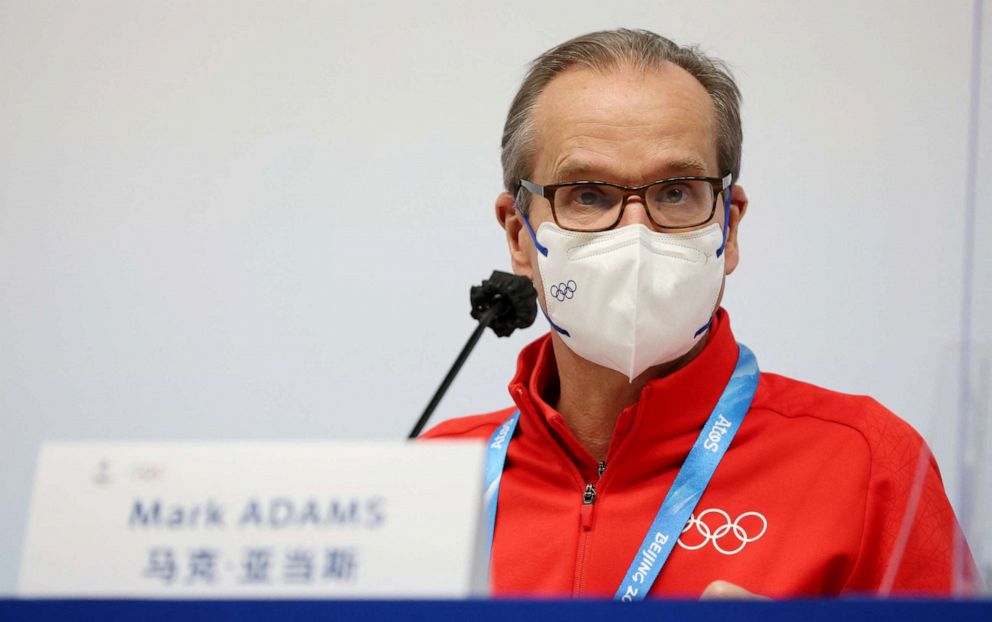
On the same day, behind the scenes, Valieva challenged the provisional suspension before the RUSADA Disciplinary Anti-Doping Committee, according to an ITA statement released two days later. The committee decided to lift her suspension, allowing her to participate in the women's singles event.
Reports emerged on Feb. 9 in Russian media outlets that Valieva had tested positive for a banned substance.
Valieva practiced in Beijing for the women's singles event as normal on Wednesday.
Feb. 10, 2022
With reports swirling in Russian media, the International Skating Union said it would not comment on any possible failed drug tests.
"Referring to the recent media reports, relating to the Figure Skating Team Event, the International Skating Union cannot disclose any information about any possible Anti-Doping rule violation," the ISU said in a statement. "This is in line with the ISU Anti-Doping Rules and IOC Anti-Doping Rules for Beijing 2022."
"The ISU will therefore not make further comments at this time," it added.
Feb. 11, 2022
For the first time, Valieva's positive test is officially made public when the ITA released a timeline about the failed test and resulting challenges. The agency also said it would not normally name a minor but did so due to "the necessity for official information due to heightened public interest."
The IOC and WADA said they would challenge the decision to overturn Valieva's suspension.
The International Skating Union also said it would challenge the decision by RUSADA to overturn Valieva's suspension in an expedited hearing before the Court of Arbitration for Sport.
"The ISU will exercise its right to appeal to the Court of Arbitration for Sport (CAS) the decision of the RUSADA Disciplinary Anti Doping Committee of February 9 to lift the provisional suspension and to ask CAS to reinstate the provisional suspension," it said in a statement.
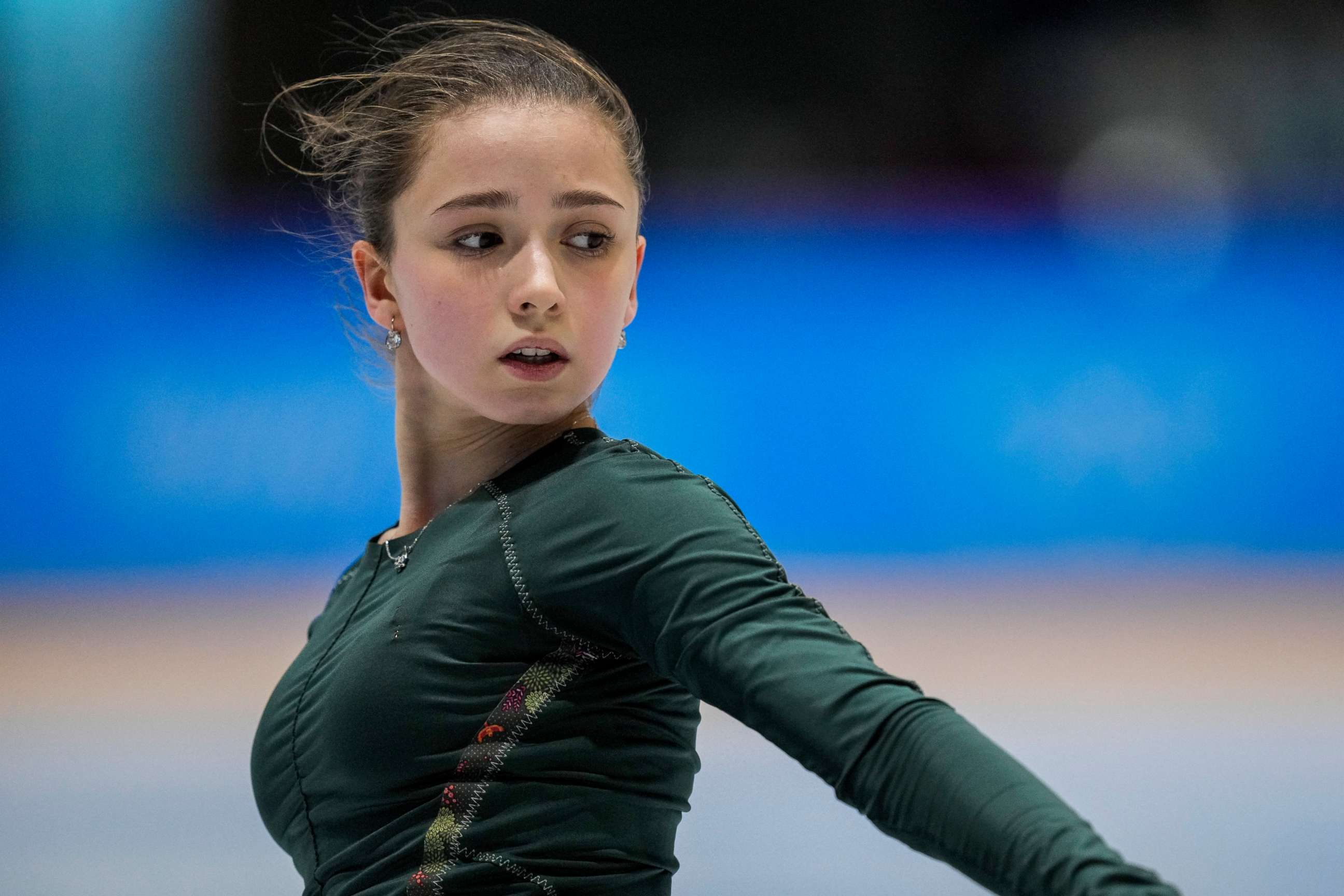
The ROC said in a statement that Valieva had tested negative for any performance-enhancing substance at the European championships and at the Beijing Olympics.
"The Russian Figure Skating Federation has no doubts about the honesty and purity of its Athlete, will make every effort to clarify the circumstances of the incident and provide the Athlete with the necessary comprehensive assistance and support," the federation said in its statement.
Kremlin spokesman Dmitry Peskov also issued a statement supporting Valieva: "We boundlessly and fully support Kamila Valieva and call on everyone to support her. And we say to Kamila: don't hide your face. You are a Russian -- perform and defeat everybody."
Feb. 12, 2022
Adams said at a press conference Saturday that he's "certain as I can be" that the expedited hearing for Valieva would take place before the women's short program on Feb. 15.
Later in the day, the Court of Arbitration for Sport issued a statement laying out the timeline for Valieva's hearing and the decision over whether she'll be allowed to compete in the individual competition.
The panel said it will hold the virtual hearing at 8:30 p.m. Beijing time (7:30 a.m. U.S. Eastern time) on Sunday, Feb. 13. It will then make a ruling on Monday afternoon Beijing time.
Feb. 13, 2022
Valieva attended a videoconference hearing with the Olympic Court of Arbitration for Sport Panel, which announced an investigation into her entourage in addition to the one the Russian Anti-Doping Agency is conducting.
"When a minor is involved there is a requirement in the World Anti-Doping Code to investigate the entourage," the panel said in a statement.
Feb. 14, 2022
Valieva was cleared to compete in figure skating at Beijing Olympics, despite the positive doping test in December, but no flower ceremony and no medal ceremony will take place should she finish among the top three skaters, the International Olympic Committee announced.
Feb. 15, 2022
Valieva finished first in the short program with a score of 82.16, topping her Russian teammate, Shcherbakova, by just shy of 2 points. Japan's Kaori Sakamoto (79.84) was third.
It was far from a dominant performance, though, as Valieva stumbled on a triple axel attempt, the hardest jump in the sport. She did hit a triple lutz-triple toe loop combination.
Her score was more than eight points lower than her short program in the team event when she did hit the triple axel cleanly.
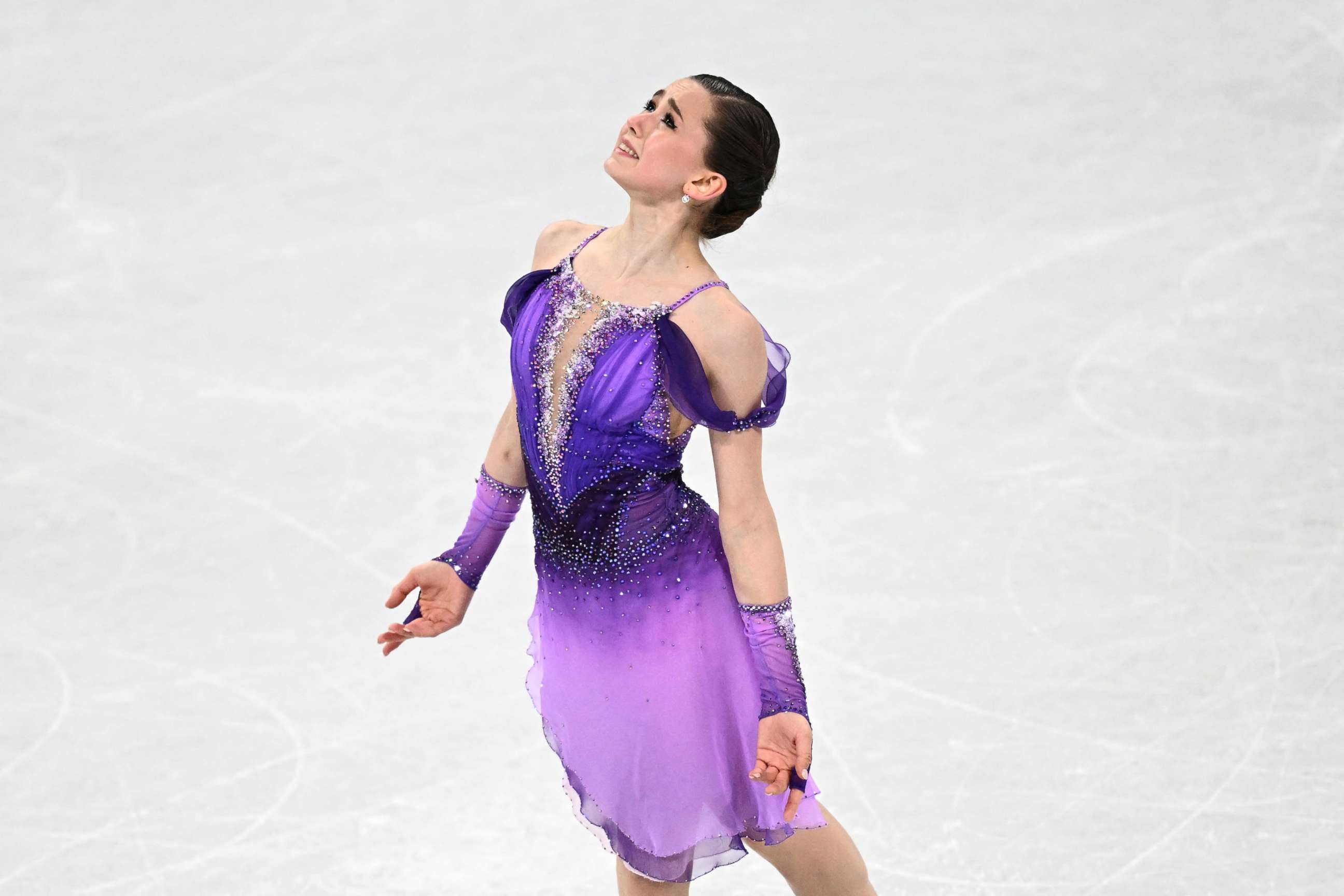
Feb. 17, 2022
Valieva had a disastrous performance, at least by her standards, in the women's single skating free skate program. She fell twice during the event, including on a quad toe loop, which she nailed during the team event in an Olympic first. She left the ice in tears.
Her 141.93 was good enough for just fifth overall and she tumbled -- literally -- out of the medals overall, finishing in fourth place behind countrywomen Anna Shcherbakova (gold) and Alexandra Trusova (silver) and Japan's Kaori Sakamoto (bronze).

Feb. 18, 2022
IOC President Thomas Bach criticized Valieva's coaches and staff after the teenager broke down after struggling in her performance, saying they showed a "tremendous coldness."
"I was very, very disturbed yesterday when I watched the competition on TV," Bach said.
April 26, 2022
President Vladimir Putin honors Russian athletes from the Olympics, including Valieva, who smiled alongside the controversial leader.

May 20, 2022
Bach made comments following the 139th session of the International Olympic Committee on how the IOC has told anti-doping bodies it wants a quick resolution to the scandal involving Valieva so a delayed medals ceremony can proceed.
"This is in the hands of anti-doping authorities. We have made it clear to them we are hoping for a fast and quick resolution of the issue," Bach said. "Once it is resolved we will have this ceremony."
June 7, 2022
The International Skating Union announces it will be raising the minimum age to 17 for figure skaters to compete in the Olympics in 2026 after backlash toward the treatment of the 15-year-old Valieva.
Sept. 14, 2022
The Russian Anti-Doping Agency completes its investigation into Valieva's case, according to TASS, the Russian state media agency. However, it does not announce its findings.
Oct. 21, 2022
The Russian Anti-Doping Agency releases a statement saying that "all processes and procedures" in the Valieva investigation are "confidential."
"Strictly following the principles of international and Russian anti-doping standards, as well as taking into account the facts and circumstances of the case, RUSADA does not intend to announce the date of the hearings, the decision or other details in the case of the figure skater -- a member of the ROC team," RUSADA writes.
Oct. 27, 2022
Witold Banka, the president of the World Anti-Doping Agency, tweets that WADA is concerned about the ongoing delay in Valieva's case and has put the Russian Anti-Doping Agency under formal notice.
The formal notice states that unless the matter is resolved soon, WADA will use its right to take the case to the Court of Arbitration for Sport.
Nov. 8, 2022
Banka tweets that he has officially referred Valieva's case to the Court of Arbitration for Sport.
"Despite putting RUSADA under formal notice to resolve the Kamila Valieva case promptly, no progress was made," he wrote. "Therefore, I can confirm WADA has now officially referred it directly to the Court of Arbitration for Sport."
Jan. 13, 2023
The Russian Anti-Doping Agency finally issues its ruling in the Valieva case, saying she committed a doping violation, but had "no fault or negligence" for the failed test.
The agency imposed no sanctions other than to disqualify Valieva from the results of the Russian championships when she tested positive.
The World Anti-Doping Agency responds, saying it has requested the full ruling "in order to determine whether the ruling is in line with the terms of the World Anti-Doping Code."
"However, based on the elements of the case with which WADA is already familiar, the Agency is concerned by the finding of 'no fault or negligence' and will not hesitate to exercise its right of appeal to the Court of Arbitration for Sport, as appropriate," WADA said in a statement.
Feb. 2, 2023
U.S. Figure Skating releases a statement ahead of the one-year anniversary of the 2022 Beijing Games and how they are frustrated with the lack of a final decision.
"As we approach the one-year anniversary of the 2022 Olympic Winter Games, U.S. Figure Skating and its athletes are deeply frustrated by the lack of a final decision in the Team Event," the governing body wrote. "We're very proud of how our Olympic medalists have carried themselves with poise and dignity since earning medals in Beijing. They have long deserved the recognition that has been withheld due to the ongoing process. U.S. Figure Skating calls for a fair and appropriate ruling to rightfully award medals to all clean sport athletes affected by this situation."
Feb. 24, 2023
In a bizarre change of events, the Russian Anti-Doping Agency appeals its own disciplinary panel's decision that Valieva bore "no fault or negligence" for her positive test in December 2021 for trimetazidine.
The Court of Arbitration for Sport has now registered appeals by the Russian Anti-Doping Agency, the International Skating Union and the World Anti-Doping Agency against the decision issued by RUSADA's disciplinary commission on Dec. 14, 2022.
RUSADA is now asking CAS to sanction Valieva with "the appropriate consequences (which may include or be limited to a reprimand) in respect if such Anti-Doping Rule Violations pursuant to the RUSADA Anti-Doping Rules."
While the ISU is looking for CAS to Valieva to be ineligible for a period of time, at the discretion of CAS, starting from Dec. 25, 2021, and all results achieved by her at the time.
As for WADA, they are seeking a ruling from CAS for Valieva to be ineligible for four years, as well as disqualify all competitive results from the date of the positive test.
Sept. 25, 2023
The Court of Arbitration for Sport begins three days of hearings at CAS Headquarters in Lausanne, Switzerland, hearing the cases involving the Association Russian Anti-Doping Agency, the International Skating Union, the World Anti-Doping Agency and Kamila Valieva.
The hearings were not public, as requested by all parties, the CAS said.
Sept. 28, 2023
After three days of testimony, the Court of Arbitration for Sport announces a delay in its proceedings, saying after the presentation of evidence by the parties involved, the panel requested further documentation and time to consider and address the documents.
"U.S. Figure Skating is profoundly disheartened by the news of a delay in the CAS hearing," Tracy Marek, CEO of U.S. Figure Skating, said in a statement. "While we recognize the inherent complexities and time requirements of legal processes, the nearly 600-day wait without a resolution is undeniably another painful setback for our dedicated athletes. We emphasize the importance of transparency in this matter, as it greatly impacts our athletes."
Nov. 9, 2023
The final hearings conclude in Valieva's case before the Court of Arbitration for Sport.
"The parties have been informed that the CAS Panel in charge of the matter will now deliberate and prepare the Arbitral Award containing the decision and grounds which is expected to be notified to the parties by the end of January 2024," the CAS said in a statement.
Jan. 29, 2024
The Court of Arbitration for Sport rules that Valieva committed an Anti-Doping Rule Violation by failing her test at the Russian Figure Skating Championships in December 2021 and is given a four-year ban from the sport.
"All competitive results of Ms Valieva from 25 December 2021 are disqualified, with all the resulting consequences (including forfeiture of any titles, awards, medals, profits, prizes, and appearance money)," the CAS wrote in its decision.
The International Skating Union then decided to strip the gold medals from Russia for the team event and hand the gold to the second-place team: the United States.
"Today, through the CAS decision, clean sport has won," Marek said in a statement. "Our nine Olympic medalists -- Nathan Chen, Vincent Zhou, Karen Chen, Alexa Knierim, Brandon Frazier, Madison Chock, Evan Bates, Madison Hubbell and Zachary Donohue -- are to be celebrated for their integrity and leadership in calling for a fair and level playing field that ensures clean competition, where competitive advantage is only achieved through dedication, hard work and abiding by the rules of sport."
Valieva was also disqualified from her win at the European Championships, which gave Shcherbakova the gold there as well.
Jan. 30, 2024
The Russian Olympic Committee says it will appeal the decision
"The Russian Olympic Committee will definitely appeal the ISU's decision to change the final standing of the figure skating team event at the 2022 Olympic Games in Beijing in the CAS," the ROC said in a statement.
The ROC added, "In fact, war has been declared on Russian sports, and, as we see, all means are good in it."
ABC News' Julia Jacobo and Drew Millhon contributed to this report.




